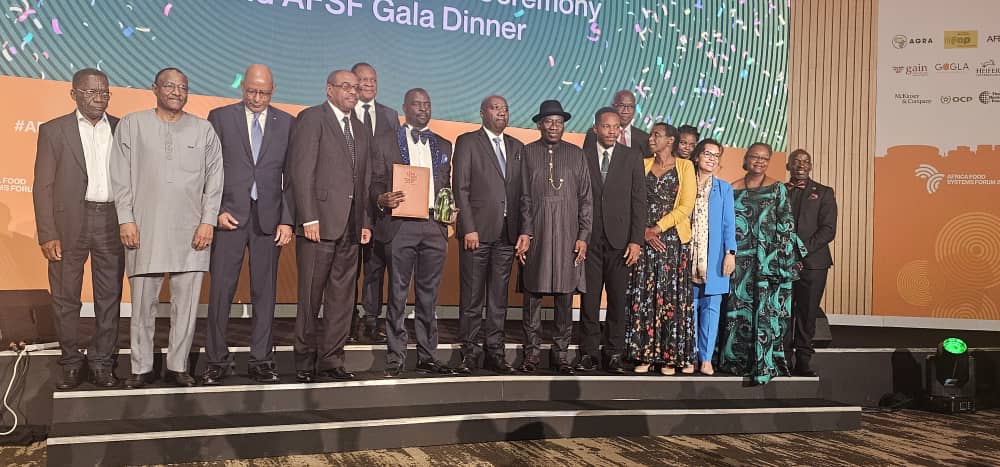Tinotenda Mhiko, the Chief Executive Officer of the Agriculture and Rural Development Authority (ARDA) has said the implementation of the revolutionary agricultural science-based Vision 2030 (V30) accelerator model has won him the prestigious 2024 Africa Food Prize.
He was addressing journalists at a press conference at the Kigali Convention Centre (KCC) in Rwanda yesterday where he was announced as the winner of the US$100,000 Africa Food Prize award that celebrates Africans who are taking control of the continent’s agriculture agenda. The award was given during the Africa Food Systems Forum running from 2 to 6 September 2024 in Kigali, Rwanda
The award casts a spotlight on bold initiatives and technical innovations that can be replicated across the continent to create a new era of food security and economic opportunity for all Africans.
“As a young scientist, I’ve worked with all classes of farmers for the past 15 years, small to medium scale, and large scale farmers to boost and improve production and productivity. The first step to achieve this is science-based farming hence innovation is inevitable. We’ve deployed several revolutionary interventions and models. An innovation to us is not only a tech platform but a working and successful model. Under the guidance of my mentor, Dr. Anxious Masuka, Zimbabwe’s Minister of Agriculture, we have implemented impactful models and innovations,” Mhiko said.
Mhiko became one of the youngest CEOs in Zimbabwe since the independence of the country after he was appointed to lead ARDA.
“It was a very huge job, but my boss has been hand-holding me, assisting me along the way. Before I go to the models, I will start with the technological innovations. We have deployed technology along every stage of a crop cycle or a specific value chain. For example, it doesn’t help to deploy an innovation on soil testing then you fail to manage the crop along the way.”
Asked what problem he was trying to solve through the model, he said he wanted to address challenges associated with agricultural production and productivity, which is a function of access to inputs by the smallholder farmers.
“So, in terms of tech, we’ve deployed digital platforms accessible on a feature phone. This is a one-stop e-extension platform and the cost containment strategy, because we work with millions of smallholder farmers across the country, harnessing satellite imagery through artificial intelligence and machine learning for hectarage measurement and crop monitoring technology.”
He said the V 30 accelerator model is a productivity enhancement tool that imparts agribusiness skills to the household beneficiaries, where the beneficiaries are both employees and shareholders of the module.
During the season, the beneficiaries are employed, provide labour, and access wages. When they harvest and market the produce, the net profit after tax is shared equally as dividends.
The model promotes financial inclusion because they open bank accounts to access working capital. It thus promotes employment creation.
Speaking on the same occasion, Hon Dr Anxious Jongwe Masuka, the Minister of Lands, Agriculture, Fisheries, Water and Rural Development said 62% of Zimbabwe’s population is in rural areas daily eke out their living from subsistence farming.
He said for President Emmerson Dambudzo Mnangagwa Vision 2030 to be accomplished in pursuit leaving no one and no place behind, there is a need to bring the 62% of the population doing agriculture differently so that they too become economic participants and not just spectators, hence the V30 Accelerator Model.
The Ministry worked on getting agriculture to become a business at a household level.
“Within the ministry, we’ve just been restructuring the ministry and saying, so how do we get the extensionists and trainers to understand that agriculture is a business? We felt that that was going to take too much time getting the 6000 extension workers throughout the country who were for the first time given motorbikes and satellite-enabled gadgets.
“But we felt that if we went through the Agricultural and Rural Development Authority and we had some proof of concept, then everyone would be able to understand what we’re talking about and we’re looking at various issues. So we said that 460 irrigation schemes on 26,000 ha, more than 50% of them are not working. They’re not working simply because the irrigators there do not understand agriculture is the business, they are not viable. They are sub-economic units.
“How do we transfer these 1.5 million beneficiaries to become economic agents for the transformation of these raw people? So we brought in what is called the v 30. We said to our president, can we launch in the harshest environment this vision? We went to a 180-hectare irrigation scheme that we opened up. We said this new model is where no one owns a piece of land, you collectively own it. We opened a company. So these irrigators became shareholders and they were trained in the business by Mr. Mhiko and the ARDA team,” Dr Masuka said.
Mr. Mhiko deployed a manager who runs the scheme, is an employee of the shareholders, and is paid from the scheme and there is a five-year business plan.
The beneficiaries now own four to five-bedroom houses in the villages and there is solar everywhere. The transformation is happening at a large in the irrigation schemes.
Dr Masuka said 330 irrigation schemes have now been transferred onto the V30 accelerator model. The scheme has cascaded to 35,000 villages and 35,000 village companies are being registered. The government is providing a 1 ha solar-powered and drip-fed irrigation system to each of the villages.






